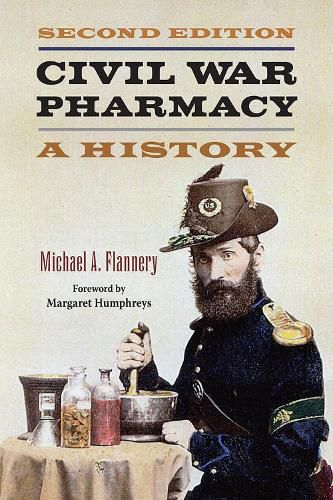Readings Newsletter
Become a Readings Member to make your shopping experience even easier.
Sign in or sign up for free!
You’re not far away from qualifying for FREE standard shipping within Australia
You’ve qualified for FREE standard shipping within Australia
The cart is loading…






When the Civil War began, the U.S. pharmaceutical industry was concentrated almost exclusively in Philadelphia and was dominated by just a few major firms; when the war ended, Union laboratories were poised to expand nationwide. Civil War Pharmacy is the first book to delineate how the growing field of pharmacy gained respect and traction in, and even distinction from, the medical world because of the large-scale manufacture and dispersion of drug supplies and therapeutics during the Civil War. Flannery captures the full societal involvement in drug provision, on both the Union and Confederate sides, and places it within the context of what was then assumed about health and healing. He examines the roles of physicians, hospital stewards, and nurses-both male and female-and analyzes how the blockade of Southern ports meant fewer pharmaceutical supplies were available for Confederate soldiers, resulting in reduced Confederate troop strength. His exploration of battlefield and naval military pharmacy is unique and valuable. Flannery provides a thorough overview of the professional, economic, and military factors comprising pharmacy from 1861 to 1865 and includes the long-term consequences of the war for the pharmaceutical profession. This book is a complete study of a major aspect of health care during a pivotal moment in American history.
$9.00 standard shipping within Australia
FREE standard shipping within Australia for orders over $100.00
Express & International shipping calculated at checkout
When the Civil War began, the U.S. pharmaceutical industry was concentrated almost exclusively in Philadelphia and was dominated by just a few major firms; when the war ended, Union laboratories were poised to expand nationwide. Civil War Pharmacy is the first book to delineate how the growing field of pharmacy gained respect and traction in, and even distinction from, the medical world because of the large-scale manufacture and dispersion of drug supplies and therapeutics during the Civil War. Flannery captures the full societal involvement in drug provision, on both the Union and Confederate sides, and places it within the context of what was then assumed about health and healing. He examines the roles of physicians, hospital stewards, and nurses-both male and female-and analyzes how the blockade of Southern ports meant fewer pharmaceutical supplies were available for Confederate soldiers, resulting in reduced Confederate troop strength. His exploration of battlefield and naval military pharmacy is unique and valuable. Flannery provides a thorough overview of the professional, economic, and military factors comprising pharmacy from 1861 to 1865 and includes the long-term consequences of the war for the pharmaceutical profession. This book is a complete study of a major aspect of health care during a pivotal moment in American history.